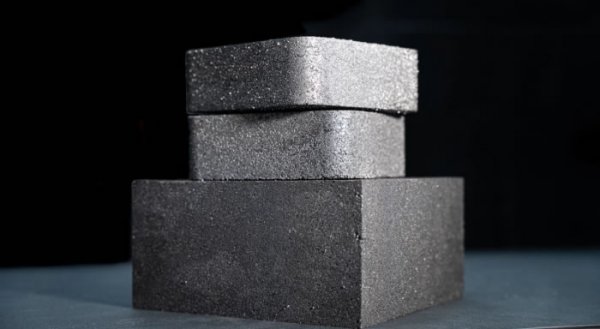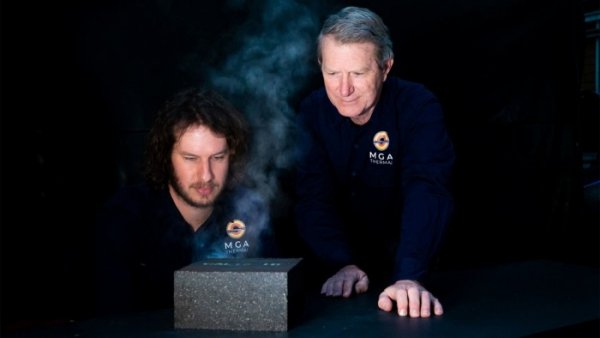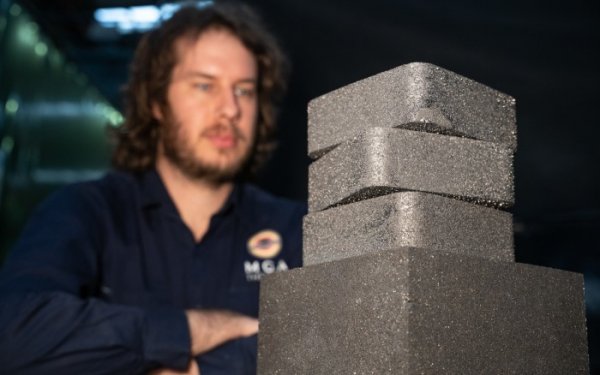Engineers from Newcastle University came up with a surprising new energy storage system that revolves around storing heat in bricks like chocolate chips melted in muffins. The team said they are efficient, scalable, safe, cheap, and can be used in existing coal-fired power plants.

Renewable energy is a key component of any plan to reduce the impact on the planet, but storage remains a major obstacle to making these systems viable. Recent solutions include Tesla’s giant lithium-ion batteries, or storing energy in unconventional forms such as molten salt or silicon, heavy rail cars on steep slopes, and huge blocks suspended in mines or stacked on towers. Things.
And now, there is a new item on the list-the mixed color gap alloy (MGA) brick. These bricks are only 30×20×16 cm (11.8×7.9×6.3 inches) in size and are made of materials with high thermal conductivity, so they can be easily heated to store energy and cooled again when needed emit energy.
In order to do this effectively, these bricks consist of two main parts. There is a solid matrix, which is fixed together in the shape of bricks, and the whole matrix is ​​embedded with meltable particles. The team described the design as similar to chocolate chips in muffins.

"Imagine that the substrate is an integral part of the cake, it maintains all shape when heated, and quickly distributes the heat," said Mark Copus, an engineer on the project. "Other particles, represented by chocolate chips, melt and store heat energy through the change phase from solid to liquid."
The idea is that these MGA blocks can use the excess energy of renewable energy for heating during peak output periods and store them for use during peak demand. Or, they can be stacked in other power plants to help recover waste heat into the system.
The heat energy they release can be used to superheat water into steam to run turbines without burning coal. This means that MGA blocks can be retrofitted into decommissioned or about to decommission coal-fired power plants to smooth the transition to renewable energy. As a bonus, this also eliminates the need to build new facilities or decommission old facilities, and there is no need to upgrade the grid infrastructure.

"Emissions from coal-fired power plants are the single largest source of greenhouse gases that contribute to global warming," said Professor Erich Kisi, co-founder of MGA Thermal. "The transformation of coal-fired power plants is a win-win approach, which can provide clean baseload power and help prevent job losses caused by power plant closures."
The team stated that the MGA block has a series of other advantages. The system can be easily expanded by adding additional blocks, and it is possible to store up to thousands of megawatt-hours of energy, and they are made of cheap and abundant materials, so their costs are obviously the same size 10% of the price of lithium batteries, and according to reports, they can still output the same energy. These materials are also non-toxic and do not pose the risk of explosion or leakage of harmful chemicals.
MGA Thermal is building a manufacturing plant in New South Wales to expand the production of this battery block to a commercial level, and is cooperating with the Swiss company E2S Power AG to begin designing a system to reuse European coal-fired power plants. Use a new battery block.
Face Mask FFP2 heart-form is suitable for indoor and outdoor use and is recommended when performing social activities or when close contact is necessary. Metal nose clip and elastic ear loops allow for secure and comfort fit. The 3D shape of FFP2 Mask is designed according to the human face shape to ensure the tightness, to increase the breathing volume of the mask, to greatly improve the permeability, and to make wearing and exhaling more comfortable.
Heart-Form Ffp2 Face Mask,Ffp2 Fold Flat Face Mask,Ffp2 Face Mask,Ffp2 Dust Mask
Shandong Shengquan New Materials Co., Ltd. , https://www.sqnewmaterials.com